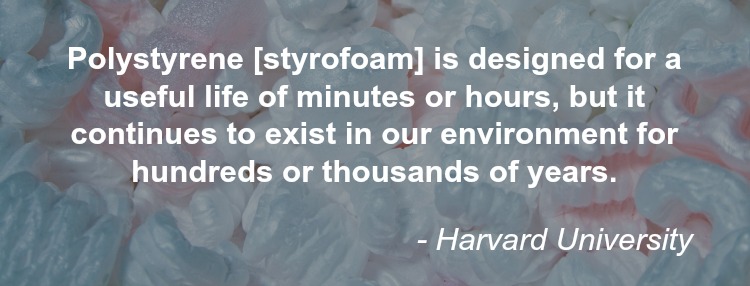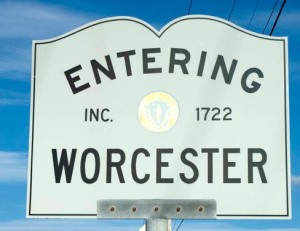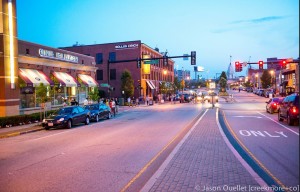Two legislators in Massachusetts have sponsored a bill that would eliminate the use of Styrofoam containers in the commonwealth. The bill has been endorsed by eighteen other lawmakers who agree that Styrofoam is harmful to the environment and should no longer be offered to consumers.
Styrofoam Bans Across the United States
Many national chains, including McDonald’s and Dunkin’ Donuts, have already eliminated the use of Styrofoam in their food containers and started using more recyclable materials.
In 2014, Washington, DC, banned the use of Styrofoam, joining many cities who had already done so. Cities and counties in California, Florida, Maine, Maryland, Minnesota, New Jersey, Oregon, and Texas have all banned the use of Styrofoam.
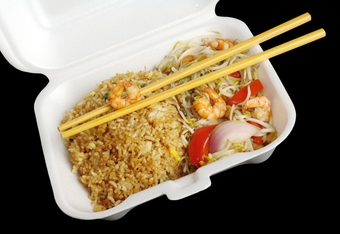 BPA and the Debated Sins of Styrofoam
BPA and the Debated Sins of Styrofoam
One of the biggest concerns with Styrofoam, or polystyrene foam, is that—while cheap to produce and easy to shape—it contains a compound called bisphenol A (BPA). Since the 1960s, BPA has been the go-to ingredient for strengthening plastics like Styrofoam; its durability and simple production made it seem like a no-brainer. At one point, the FDA even declared it to be entirely safe.
However, a number of recent studies have challenged the infallibility of BPA and polystyrene. The two have been linked to hormonal balance, heart disease, diabetes, breast cancer, impotence, and developmental issues in fetuses and children.
The arguments from both sides of the BPA debate are admittedly a little blurry. Some experts are adamant that BPA is safe while others vehemently declare it to be a life-threatening compound. Patricia Hunt, a graduate professor and geneticist at Case Western Reserve University, along with a team of 36 other researches, dove into the data. What they found was that, of the hundreds of government-funded studies analyzed, “90 percent had concluded BPA was a health risk. It was the dozen or so industry-funded studies [ . . . ] that failed to replicate other BPA research.” These findings imply that human bias may have a significant effect on the data available to the public.
Some argue that BPA is only unsafe at extreme doses (doses higher than the ones received by eating takeout from a Styrofoam container). However, Hunt mentioned that BPA doesn’t necessarily “play by the rules.” At high doses, BPA may “shut down the body’s response”; smaller doses of BPA may actually be worse for us.
One incontestable fact about BPA is that it negatively impacts our environment. Harvard University writes that “Polystyrene foam is designed for a useful life of minutes or hours, but it continues to exist in our environment for hundreds or thousands of years.” It cannot be recycled (it costs more to recycle than it does to produce), so Styrofoam and Styrofoam products “fill up 30% of landfill space.” It is also manufactured using hydrochlorofluorocarbons (HCFCs), which are known to deplete the ozone layer. The EPA adds that 90% of floating marine litter consists of plastic or polystyrene products.
Polypropylene: A Better Alternative
Polypropylene represents a safer alternative to Styrofoam. It is a versatile, lightweight, heat-resistant polymer resin that is cheap to use and able to be utilized in all kinds of products. It can essentially do everything Styrofoam can. The kicker? Polypropylene does not contain BPA. So, since BPA may or may not be terrible for us (and no one can seem to agree), many would rather not risk it and just use polypropylene instead. Paper, which has been implemented in many Dunkin’ Donuts locations, including Somerville, MA, is another viable solution.
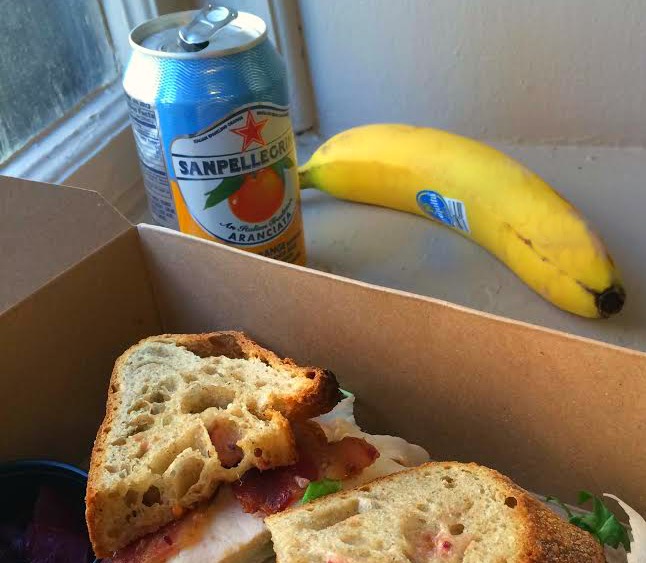
Birch Tree Bread Company, a restaurant based in Worcester, MA, prides itself on only using recycled and/or recyclable material.
Reactions to Styrofoam Bans
Despite the advantages of polypropylene and paper, some restaurants are reluctant to stop using their foam containers; naturally, the Styrofoam industry is also against the ban, noting the thousands of jobs it creates every year. Spokespeople for the industry argue that there are six Styrofoam recycling centers in Massachusetts and that more could be added in order to better handle Styrofoam waste in the state.
Effective January 2014, Amherst, MA, implemented a bylaw that bans restaurants from using Styrofoam containers, citing their environmental hazards and health risks. They also add that one of the key ingredients in Styrofoam, styrene, is a recognized carcinogen.
Amherst’s town website reports that, from a business perspective, the biggest issue with switching to polypropylene or other environmentally friendly materials is cost. The other materials do tend to be more expensive (though there are efforts to address that), so if the bill does become law, MA businesses will have to “absorb a few cents of additional cost for recyclable or compostable take-out containers.” While a few cents may not seem like much, it can add up for small businesses just getting off the ground.
New York City implemented their own Styrofoam ban on July 1, 2015. Mayor Bill de Blasio told MSNBC, “These products cause real environmental harm and have no place in New York City.” Opponents of the new rule in NYC have begun a petition against it, saying it is unnecessarily expensive and inconvenient for small businesses. A Long Beach, CA, school district that actually switched from biodegradable food trays to Styrofoam trays has since saved about $1 million each year.
Many cities in Massachusetts have joined Amherst and NYC’s effort to eliminate Styrofoam. Brookline, Great Barrington, Brookline, and Somerville, MA, have all banned Styrofoam in their communities.
Where do you stand? Is Styrofoam worth banning or should MA keep it around?



